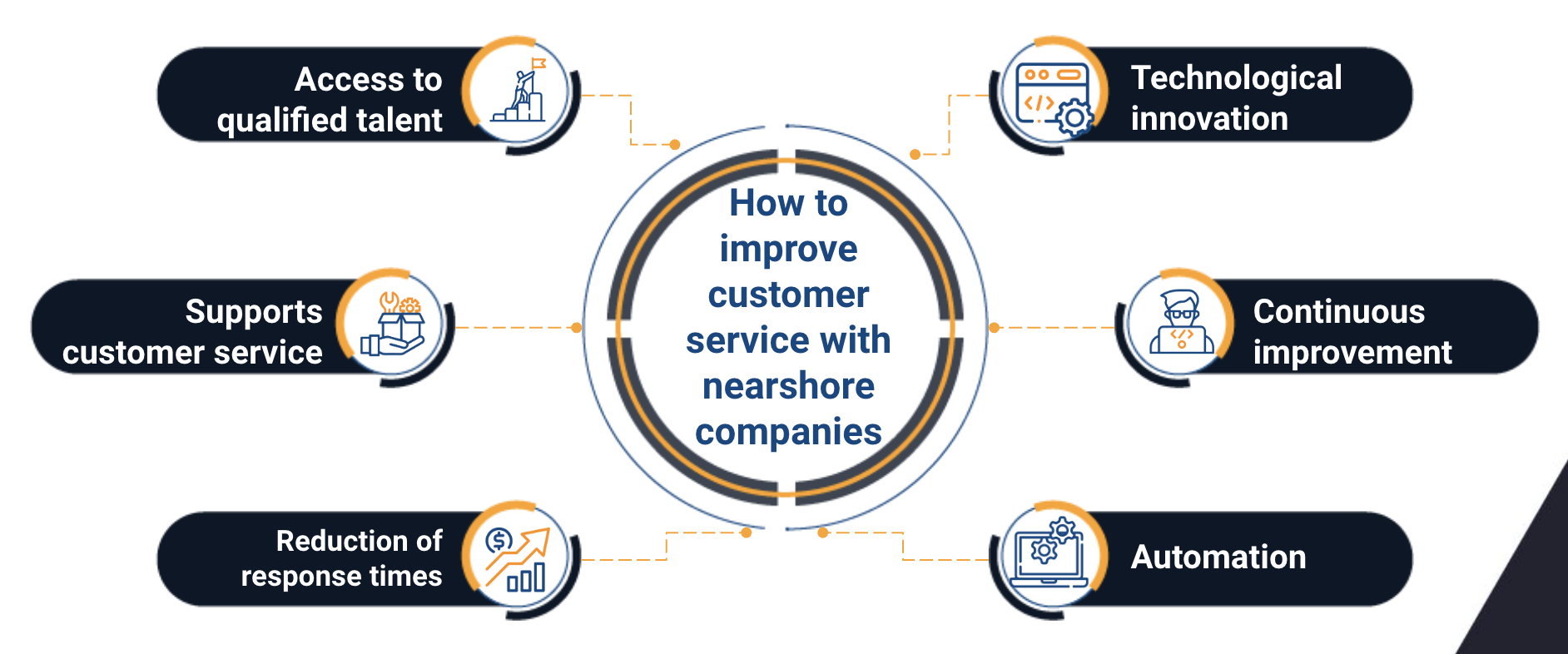
Improving the quality of customer service is crucial to the success and sustainability of any company. One of the emerging strategies that many organizations are adopting is collaboration with nearshore companies.
These companies offer outsourced services from geographically close locations, providing an ideal combination of talent, technology and cost efficiency. In this article, we will explore the role that nearshore companies play in boosting customer service and how they can be an invaluable tool for managers and business leaders looking to improve the customer experience.

What are Nearshore Companies?
Nearshore companies are companies that offer outsourcing services from locations close to the client's home country. Unlike offshore outsourcing, which involves working with suppliers in more distant regions like Asia, nearshoring focuses on working with suppliers in neighboring countries or in the same time zone, making communication and collaboration easier.
Advantages of working with Nearshore Companies
- Geographic Proximity:
Geographic proximity allows for shorter, less expensive business trips, facilitating face-to-face meetings when necessary.
- Cultural Similarities:
Working with teams that share cultural similarities minimizes communication barriers and improves team cohesion.
- Similar Time Zones:
Being in the same or similar time zone improves coordination and allows for more fluid communication in real time.
- Competitive Costs:
Although costs may be slightly higher than offshoring, nearshoring offers a better cost-benefit ratio when considering savings in time and operational efficiency.

Improving Customer Service through Nearshore Companies
Customer service is a critical component to customer satisfaction and brand loyalty. Nearshore companies can play a crucial role in improving customer service in several ways:
1. Access to Qualified Talent
Nearshore companies in regions such as Latin America or Eastern Europe have access to a vast pool of highly qualified professionals. These professionals not only possess the necessary technical skills, but are also well versed in client management and interpersonal communication.
Examples of Nearshore Regions:
- Latin America: Countries such as Mexico, Colombia and Costa Rica have emerged as popular destinations for nearshoring services due to their proximity to the United States and their growing technological talent.
- Eastern Europe: Countries such as Poland, Romania and Ukraine offer a combination of advanced technical skills and English language proficiency.
2. Improved Customer Experience
Nearshore companies can help improve customer experience by providing personalized services tailored to specific customer needs.
Strategies to Improve the Experience:
- Multi-Channel Customer Support: Businesses can offer support through multiple channels such as live chat, email and phone, ensuring customers can communicate the way they prefer.
- Personalization: Using data analytics and advanced technology, nearshore companies can personalize customer interactions, improving satisfaction and loyalty.
3. Reduction of Response Times
The ability to respond quickly to customer inquiries and issues is critical to effective customer service. Nearshore companies allow for faster response times thanks to their proximity and time zone alignment.
Benefits of Reduced Response Times:
- Improved customer satisfaction by resolving issues in a timely manner.
- Increased operational efficiency by reducing communication bottlenecks.

4. Innovation and Continuous Improvement
Nearshore companies are often at the forefront of technology trends, allowing companies to access the latest innovations in customer service.
Examples of Innovation:
- Automation and Chatbots: Implementation of artificial intelligence solutions to manage routine queries and free up time for more complex interactions.
- Predictive Analytics: Using data to anticipate customer needs and offer proactive solutions.
Considerations When Choosing a Nearshore Company
When considering hiring a nearshore company, it is important to consider several factors to ensure that a suitable partner is chosen for your needs.
1. Assessment of Skills and Experience
It is crucial to evaluate the nearshore company's skills and experience in the area of customer service. Look for companies with a proven track record in your specific industry.
Aspects to evaluate:
- Experience in client management.
- Relevant technical and technology knowledge.
- Testimonials and references from previous clients.

2. Cultural Alignment
Cultural alignment is critical to ensuring successful collaboration. Make sure the nearshore company shares similar cultural values and practices as your company.
How to Assess Cultural Alignment:
- Conduct interviews and meetings to get to know the management team.
- Evaluate the company's work ethic and communication practices.
3. Data Security and Compliance
Since nearshore companies will handle sensitive customer data, it is vital to ensure they comply with data privacy and security regulations.
Key Security Measures:
- Compliance with regulations such as GDPR or CCPA.
- Implementation of robust security policies and data management practices.
4. Scalability and Flexibility
Choose a nearshore company that can scale its operations according to the changing needs of your business.
Questions to Evaluate Scalability:
- Can the nearshore company increase or reduce its staff quickly?
- Do you offer customizable solutions that fit your company's specific needs?
Nearshore companies offer a strategic solution to improve the quality of customer service, providing access to qualified talent, technological innovation and operational efficiency. For managers and business leaders looking to improve the customer experience, nearshoring represents a unique opportunity to optimize their operations and stay competitive in a constantly evolving market.
When evaluating nearshore partners, it is essential to consider factors such as skills, cultural alignment, data security, and scalability to ensure successful collaboration. With the right strategy, companies can transform their customer service and achieve new levels of success.

